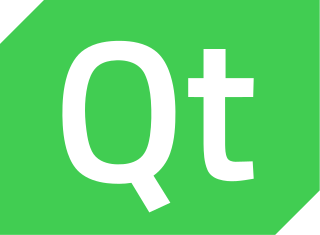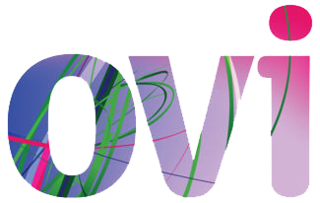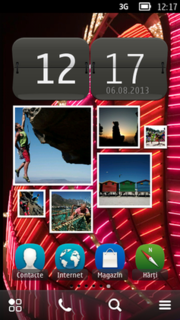
Qt is a free and open-source widget toolkit for creating graphical user interfaces as well as cross-platform applications that run on various software and hardware platforms such as Linux, Windows, macOS, Android or embedded systems with little or no change in the underlying codebase while still being a native application with native capabilities and speed. Qt is currently being developed by The Qt Company, a publicly listed company, and the Qt Project under open-source governance, involving individual developers and organizations working to advance Qt. Qt is available under both commercial licenses and open source GPL 2.0, GPL 3.0, and LGPL 3.0 licenses.
Java Platform, Micro Edition or Java ME is a computing platform for development and deployment of portable code for embedded and mobile devices. Java ME was formerly known as Java 2 Platform, Micro Edition or J2ME.

The S60 Platform is a software platform for smartphones that runs on top of the Symbian operating system. It was created by Nokia based on the 'Pearl' user interface from Symbian Ltd. It was introduced at COMDEX in November 2001 and first shipped with the Nokia 7650 smartphone. The platform has since seen 5 updated editions. Series 60 was renamed to S60 in November 2005.

UIQ is a software platform based upon Symbian OS, created by UIQ Technology. Essentially this is a graphical user interface layer that provides additional components to the core OS, to enable the development of feature-rich mobile phones that are open to expanded capabilities through third-party applications.

The Nokia 9210 Communicator is a third-generation Communicator series smartphone produced by Nokia, introduced 21 November 2000. It greatly improved on the second generation Nokia 9110 Communicator, providing a colour main screen and using an ARM processor. It is one of the few mobile phones able to send and receive fax.

Nokia Browser for Symbian was the default web browser for the S60 and Symbian mobile phone platform. The browser is based on a port of Apple Inc.’s open-source WebCore and JavaScriptCore frameworks which form the WebKit rendering engine that Apple uses in its Safari Web browser.
Carbide.c++ is a software development tool for C++ development on Symbian OS. It is used to develop phones that use the OS, as well as applications that run on those phones. It is based on the Eclipse IDE platform enhanced with extra plug-ins to support Symbian OS development. The product is provided by the Symbian Foundation under an open source model. In April 2009, Nokia transferred Carbide.c++ and many other software developer tools to the Symbian Foundation. Members of the Symbian community now manage and contribute code to the Carbide.c++ product.

The Tizen Association is a non-profit technology consortium organization dedicated to creating Tizen as the first truly open, hardware-independent, Linux-based mobile operating system for smartphone mobile devices. The mission of the LiMo Foundation is to create an open, Linux-based software platform for use by industry to produce mobile devices through a balanced and transparent contribution process, enabling an ecosystem of differentiated products, applications and services. The governance is "open and transparent": leadership and decision making are shared. The founding members were Motorola, NEC, NTT DoCoMo, Panasonic Mobile Communications, Samsung Electronics, and Vodafone. The work result was the LiMo Platform. The work was integrated into mobile phone products from NEC, Panasonic and Samsung and later combined in the Tizen platform.

Ovi by Nokia was the brand for Nokia's Internet services. The Ovi services could be used from a mobile device, computer or via the web. Nokia focused on five key service areas: Games, Maps, Media, Messaging and Music. Nokia's aim with Ovi was to include third party developers, such as operators and third-party services like Yahoo's Flickr photo site. With the announcement of Ovi Maps Player API, Nokia started to evolve their services into a platform, enabling third parties to make use of Nokia's Ovi services.

Hildon is an application framework originally developed for mobile devices running the Linux operating system as well as the Symbian operating system. The Symbian variant of Hildon was discontinued with the cancellation of Series 90. It was developed by Nokia for the Maemo operating system and is now a part of GNOME. It focuses on providing a finger-friendly interface. It is primarily a set of GTK+ extensions that provide mobile-device–oriented functionality, but also provides a desktop environment that includes a task navigator for opening and switching between programs, a control panel for user settings, and status bar, task bar and home applets. It is standard on the Maemo platform used by the Nokia Internet Tablets and the Nokia N900 smartphone.
The Python for S60 also called PyS60, was Nokia’s port of the general Python programming language to its S60 software platform, originally based on Python 2.2.2 from 2002.
The latest final version, PyS60-2.0.0, released on 11 February 2010 updated the python core to version 2.5.4.
P.I.P.S. is a term for Symbian software libraries that means, P.I.P.S. Is POSIX on Symbian OS. It is intended to help C language programmers in migration of desktop and server middleware, applications to Symbian OS based mobile smartphone devices.
This is a list of devices that run on the Symbian platform mobile operating system, including their proprietary predecessors running on Symbian OS and EPOC.
A mobile app or mobile application is a computer program or software application designed to run on a mobile device such as a phone/tablet or watch. Apps were originally intended for productivity assistance such as Email, calendar, and contact databases, but the public demand for apps caused rapid expansion into other areas such as mobile games, factory automation, GPS and location-based services, order-tracking, and ticket purchases, so that there are now millions of apps available. Apps are generally downloaded from application distribution platforms which are operated by the owner of the mobile operating system, such as the App Store (iOS) or Google Play Store. Some apps are free, and others have a price, with the profit being split between the application's creator and the distribution platform.. Mobile applications often stand in contrast to desktop applications which are designed to run on desktop computers, and web applications which run in mobile web browsers rather than directly on the mobile device.
Microsoft Mobile Services are a set of proprietary mobile services created specifically for mobile devices, they are typically offered through mobile applications and mobile browser for Windows Phone, Android, iOS, BlackBerry, Nokia /block/deny/405platforms, BREW, and Java ME. Microsoft's mobile services are typically connected with a Microsoft account and often come preinstalled on Microsoft's own mobile operating systems while they are offered via various means for other platforms. Microsoft started to develop for mobile computing platforms with the launch of Windows CE in 1996 and later added Microsoft's Pocket Office suite to their Handheld PC line of PDAs in April 2000. From December 2014 to June 2015, Microsoft made a number of corporate acquisitions, buying several of the top applications listed in Google Play and the App Store including Acompli, Sunrise Calendar, Datazen, Wunderlist, Echo Notification Lockscreen, and MileIQ.
EPOC is a mobile operating system developed by Psion, a British company founded in 1980. It began as a 16-bit operating system for Psion's own x86-compatible devices, and was later replaced by a 32-bit system for x86 and ARM. Psion licensed the 32-bit system to other hardware manufacturers, such as Ericsson.










